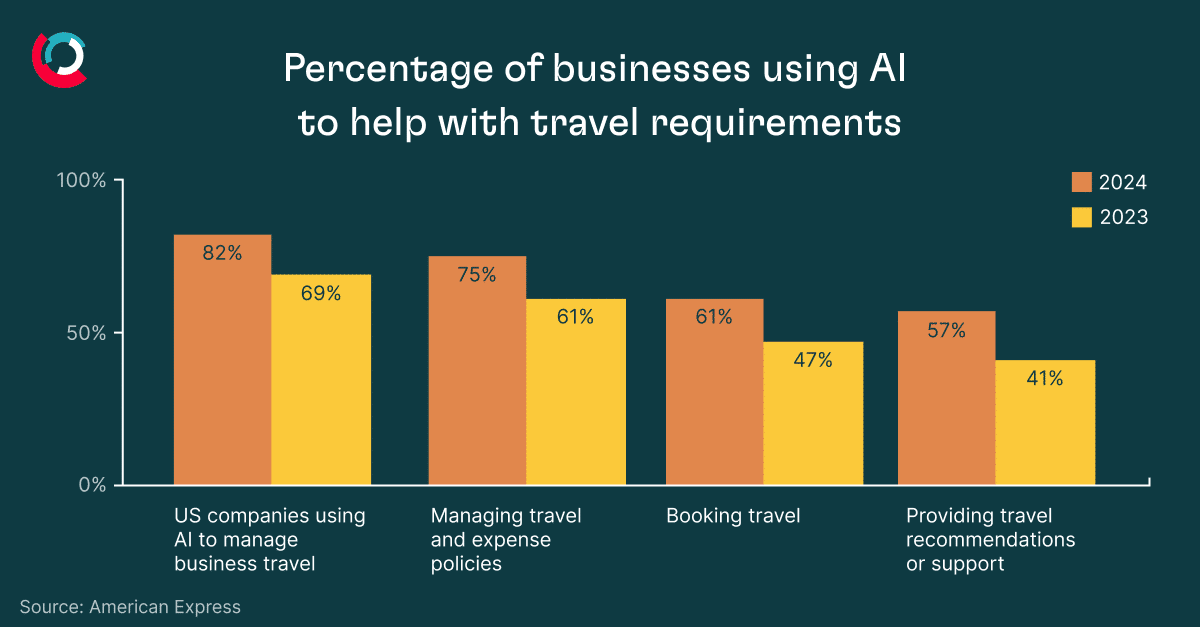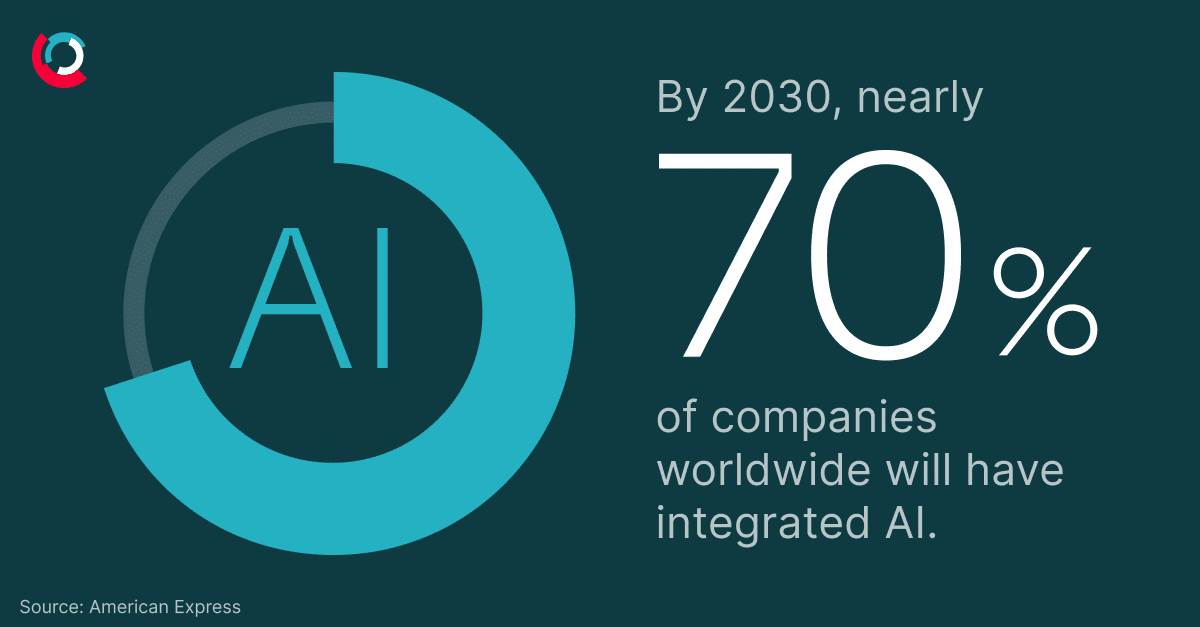With contributions by Claudia Gualdi
The travel industry is experiencing a transformative shift, powered by artificial intelligence (AI). From revolutionising customer service to optimising pricing strategies, AI is redefining customer service and streamlining operations, delivering tailored experiences that resonate with modern travellers.
At the heart of this evolution are AI-powered travel consultants, delivering highly personalised, efficient and cost-effective solutions that enhance the traveller experience. In 2025, the role of AI in travel is set to expand, promising profound benefits and challenges for both businesses and travellers alike.
How AI is transforming travel
AI adoption in the travel sector is growing rapidly, with technologies like natural language processing, predictive analytics and chatbots already helping companies better understand and respond to customer needs. These innovations are not just streamlining operations but redefining how travel services meet individual needs, making AI a key part of the industry’s future.
In the two years since the launch of ChatGPT, the travel industry has been buzzing with excitement about the transformative potential of generative artificial intelligence. Automation plays a crucial role in booking, cancellations and customer service, making these processes faster and more accurate. The standardisation of 24/7 virtual support will ensure travellers can access assistance at any time, further enhancing convenience and satisfaction.
Personalisation
One of the most exciting aspects of AI in the sector is the level of personalisation it offers. AI factors in real-time data like weather, local events and availability to enhance the travel experience. It also crafts hyper-personalised itineraries customised to travellers’ preferences and budgets, ensuring each journey is unique and perfectly suited to the traveller’s needs.
Artificial Intelligence is revolutionising both mainstream and niche travel sectors, from luxury travel to wellness and gastronomy experiences. With AI, luxury travel becomes more than just a trip, it becomes a personalised adventure. AI algorithms analyse a huge amount of data, including past travels, personal preferences, social media activity, and real-time feedback, while also offering 24/7 support via virtual assistants. These services ensure a seamless journey that exceeds expectations. For example, an art enthusiast could enjoy a private tour of exclusive galleries, all arranged by AI. Virtual reality previews allow travellers to explore destinations and accommodations before booking, helping them make confident, well-informed decisions.
Additionally, the focus on health and safety in post-pandemic travel has sped up the adoption of AI to provide customised wellness options, including fitness routines, spa treatments and dining experiences. There is a rise of immersive, multi-sensory activities in wellness, spas, fitness centres, and entertainment venues—such as forest bathing, hugging therapy, scream therapy, laughter yoga, cuddle parties, and flotation tanks.
Ethical concerns
The rise of Artificial Intelligence in travel also brings ethical concerns. With AI systems relying heavily on data, there are legitimate worries about privacy and the potential for biases in decision-making. Additionally, the increasing reliance on technology could reduce the need for human consultants, potentially displacing jobs and diminishing the personal touch that many travellers value.
Benefits and Limitations of AI-Powered Travel Consultants
Benefits: AI-powered travel consultants offer faster and more accurate services, leveraging data analytics to deliver highly personalised travel recommendations. These tools enhance customer satisfaction and loyalty by anticipating preferences and tailoring suggestions to individual needs. For businesses, AI’s ability to process vast amounts of data provides actionable insights, enabling smarter decision-making and improved operational efficiency.
Limitations: Over-reliance on technology exposes businesses to risks like system failures and cyberattacks, which could disrupt services and lead to potential data leaks. The initial costs of adopting AI solutions are significant, requiring a careful assessment of long-term benefits to justify the investment. Concerns around data privacy, biases in AI systems and the potential reduction in human oversight also need to be addressed, potentially alienating customers who value empathy and nuanced understanding in their interactions.
Impact on Businesses
According to a recent survey by American Express, which looked at business travellers and decision-makers, 82% of US companies were using AI to manage business travel in 2024, up from 69% in the previous year. More businesses are turning to AI for managing travel and expense policies (75% vs. 61%), booking travel (61% vs. 47%), and providing travel recommendations or support (57% vs. 41%) compared to 2023. Over half (54%) of companies using AI tools for business travel are also training their employees on how to use them, helping to address any concerns about its proper use.
Travel agencies, corporate travel managers and airlines can streamline operations, save costs and improve efficiency through automation. Routine tasks like bookings, cancellations and customer service can be handled more swiftly, freeing humans to focus on high-value interactions.
Corporate travel management will particularly benefit from AI tools that enable precise tracking, cost optimisation and real-time risk assessment. These tools can provide real-time alerts and adjust travel plans dynamically to enhance traveller safety and minimise disruptions.
AI-driven dynamic pricing models in the hospitality and airline sectors will transform revenue management. These systems track rates in real-time based on factors like demand and market trends. Simultaneously, it will enhance the customer experience through features like faster check-ins, tailored itineraries and in-flight services, creating a seamless journey for travellers.
Opportunities for Businesses
To stay competitive in an AI-driven landscape, businesses must invest in advanced technologies. Equally important is prioritising staff training to ensure teams can collaborate effectively with these tools. Partnering with AI innovators and startups can help travel companies remain at the forefront of emerging trends.
Crucially, while AI can optimise operations, the human element must remain integral to the travel experience. Emotional intelligence, empathy and problem-solving in complex scenarios are areas where humans excel, complementing the precision and efficiency of AI.
What’s next?
While AI adoption is still in its early stages for many organisations, projections indicate that by 2030, nearly 70% of companies worldwide will have integrated this technology into their operations. By adopting AI responsibly, travel companies can harness cutting-edge technology while prioritising transparency, inclusivity and the irreplaceable value of human connection.
As AI systems become more advanced, their role will increasingly complement human expertise, allowing employees to focus on areas like empathy, creative problem-solving and building trust with customers. By emphasising collaboration between AI systems and human teams, organisations can create an environment where both technologies and employees thrive, fostering innovation while safeguarding jobs. This balanced approach will position them as leaders in the evolving travel industry, ensuring both innovation and customer trust.


